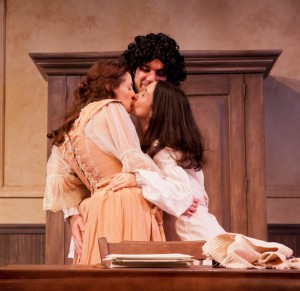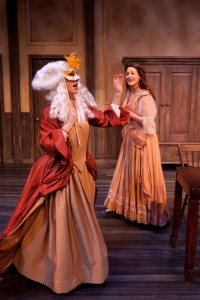‘Or,’ What? In the Dizzying New Play at off the WALL, That’s the Question

Luckily Aphra Behn (Erika Cuenca) asks before shooting, or William Scot (Ethan Hova) would be riddled.
Is it a screwball sex farce or a feminist history play? Yes. The play called Or, (the comma is part of the title) is both. You can watch it for hoots, or for insight into the roots of today’s gender issues and identity crises.
Either way you get a heaping helping of humping physical comedy, combined with witty wordplay. And you may learn a few things about Aphra Behn, a.k.a. Agent 160, whose life provided the basis for this modern work of fiction. She was a writer, a spy, a lover of men, and maybe sometimes of women. The play depicts her multitasking long before the term was invented.
Or, by Liz Duffy Adams, was an off-Broadway hit at Women’s Project Theater in New York. Now it’s being staged through Jan. 10 by off the WALL Productions in Carnegie. That quaint old town just outside Pittsburgh has become a haven for out-of-the-mainstream theater. Which makes it an apt locale for a strange story about people who tested the limits of their times more than 300 years ago.
The Context, the Characters
Or, is set in England during the Restoration, a period when Englishmen—and women—were busy exercising both the literary arts and their libidos. The culturally repressive Puritan regime of Oliver Cromwell and his comrades had ended in 1660. What followed was a chaotic time that presaged, in some ways, the social upheavals of the 1960s.
Theaters had been shut down to prevent the public from being tempted by sinful diversions. When Charles II, the “restored” king, came back from exile, they re-opened with some of the bawdiest fare imaginable. Women, in the Puritan view, were expected to be demure and submissive. Now they began not only acting on stage but also writing for it. At the forefront of this new era were the three characters we meet in Or,.
Charles II himself (played by Ethan Hova) appears as the royal philanderer. In real life the so-called Merry Monarch was a good-natured man who liked to share his goodness, fathering well over a dozen children, none legitimate.
Nell Gwynne (played by Robin Abramson) was the artful leading lady of Restoration comedy and the first actress to be a mass-market sex symbol. She joked openly about her conjugal affairs; men flocked to the theater to ogle her; a nude drawing of Nell became a prized pin-up.
And the woman in the center was Aphra Behn (Erika Cuenca). Much of Aphra’s life is clouded in mystery. Apparently a commoner by birth, she claimed to be (but may or may not have been) a young widow. Records show that amid the European political intrigues of the age, she was a spy in the service of Charles II—hence the Agent 160 handle—and, upon learning that Charles didn’t pay his secret agents reliably, turned to writing.
In that field Aphra excelled. The first Englishwoman known to actually earn a living as a writer, she authored a parade of popular plays, along with poetry and a couple of the world’s early novels.
But she often had to publish anonymously, and enduring fame was not in the cards. Her sexually adventurous writing was dismissed by later generations as merely smutty. A song in one play declares that women were “Born free as man to love and range / Till nobler nature did to custom change; / Custom, that dull excuse for fools / Who think all virtue to consist in rules …” Many folks still didn’t want to hear such stuff from a woman.
Thus Aphra was relegated to history’s footnotes until recent writers, especially women, rediscovered her. When American playwright Duffy Adams took her on as a subject, the result was Or,.
Timeless Language, Endless Wackiness
The play begins elegantly, with Aphra speaking a prologue in a lilting style that’s an updated version of centuries-old English. She explains that the quality of “or”-ness is essential to humankind, since none of us can be defined by a single, simple role: “We all embody opposites within, or else we’re frankly far too dull to live.”
If the words sound poetic, they are; Duffy Adams wrote them in iambic pentameter. Throughout Or, the rhythms vary but the language remains a nice blend of modern and old-timey. It’s one of the play’s coolest features, allowing characters from the 1600s to curse and exclaim as we do without sounding anachronistic.
And there are exclamations aplenty. The play imagines Aphra in the hectic transitional stage of her career, shifting from low-paid spy work to big-time writing. After that leisurely prologue, the action quickly cranks up into farce mode. Our heroine has greeted us from debtor’s prison, where she is startled by a visitor: a man in a mask. Aha! It’s King Charlie, cruising incognito. He grandly offers to settle her debts and more, in return for certain favors. Uh-uh, not those favors, counters Aphra! Not yet, anyway!
Adroitly eluding his majesty’s mitts, Aphra wrangles her way out of prison and into a sumptuous apartment. She starts to write a play but finishing it is a problem, because now she has a rotating merry-go-round of visitors. The high-society theater producer Lady Davenant wants the play urgently. Nell Gwynne wants to introduce Aphra to the joys of womanly love—until Charles shows up again, and Nell targets him instead! Then in walks a blast from Aphra’s past, double agent William Scot, bringing a double agenda of fresh espionage and lust.
Bottom Lines, Open Questions
The whole business is a high-pitched game of musical chairs, tongues, and other body parts. Dizzyingly—and skillfully—actors Hova and Abramson play all the roles except for Aphra’s, including some not mentioned here. They manage the feat by dodging in or out of various doors between quick-changes of costume.
On the night I attended, the play kept much of the audience grinning and chuckling if not belly-laughing. Afterward, the lobby was filled with a “well, how about that!” sort of buzz.
Or, crams in a ton of historical context seamlessly—I spoke to audience members who followed the action easily despite lacking prior knowledge—and Or, left ‘em thinking. Some people I know went home to learn more about Aphra Behn, et al, on the Internet. Discussions ensued.
The one reservation I had was with how the playwright (and to some extent director and cast) presented the subject matter generally. Would Or, work even better if it were juiced up further—or conversely, toned down a bit? The play deals in predicaments and emotions that are wacky but serious, and I might’ve preferred that it either go more extremely over-the-top, pushing the absurdity pedal right to the metal, or sail a more serious course where absurd aspects stand out when they bubble to the surface.
Then again, that’s the “or” factor, isn’t it? We all have our opposites, churning and yearning. Which is why plays are forever tweaked and new plays are written. Meanwhile this Or, exists as a singular spectacle. It’s the kind of theater you won’t see just anywhere—the kind that may leave you, too, saying, “How about that?”
Closing Credits and Ticket Info
Liz Duffy Adams’ Or, is directed for off the WALL Productions by John Shepard. Erika Cuenca wavers solidly (if you can picture that) as Aphra Behn, while Robin Abramson is a bundle of energy in her roles, and Ethan Hova is a droll dude. Through Jan. 10 at off the WALL Performing Arts Center, 25 W. Main St., Carnegie. For times and tickets visit off the WALL or phone 1-888-71-TICKETS.
Photos by Heather Mull.
Mike Vargo, a Pittsburgh-based writer and editor, covers theater for Entertainment Central.
Share on Social Media
Follow Entertainment Central
Latest Stories
Sign up for the EC Newsletter









